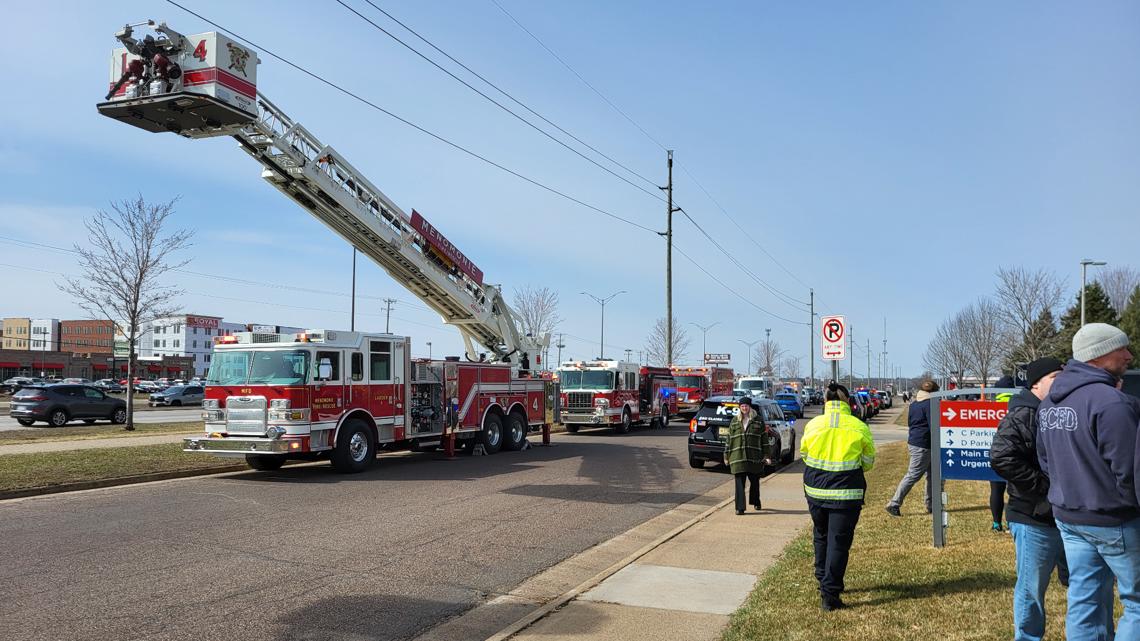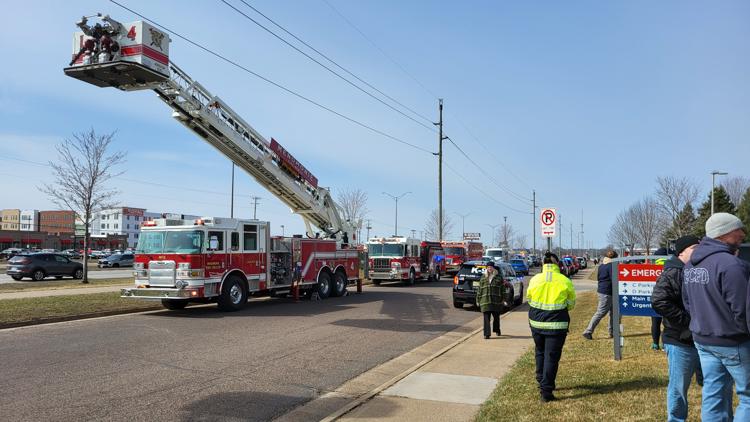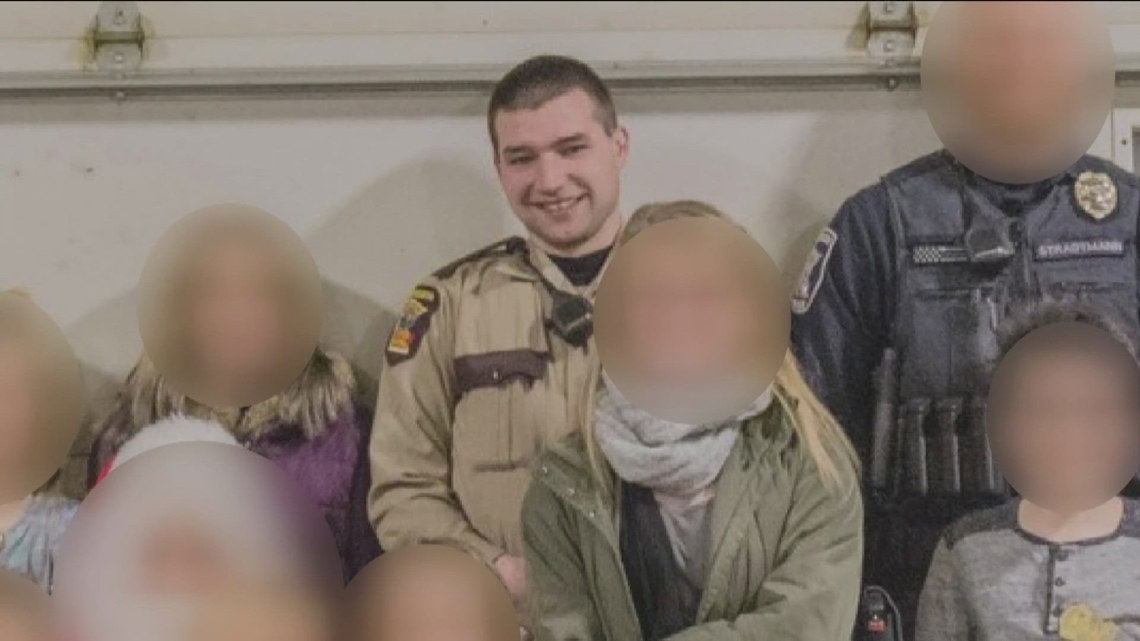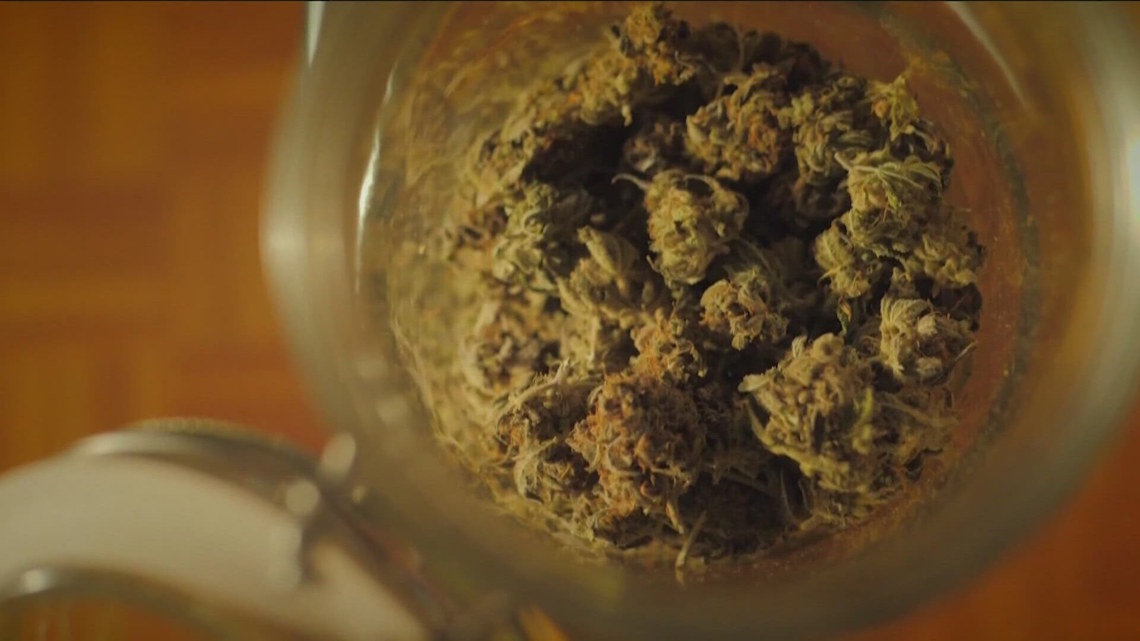Kare11
Heroes’ send-off for laid off health workers in Wisconsin


The Eau Claire and Chippewa Falls hospitals and all Prevea Health locations in the Chippewa Valley are forced to permanently close.
CHIPPEWA FALLS, Wis. — There was a heroes send-off across the border in western Wisconsin on Thursday.
The public showed up to show their support for hundreds of employees losing their jobs at Sacred Heart Hospital in Eau Claire and St. Joseph’s Hospital in Chippewa Falls, both of which will permanently close on Friday.
The announcement shocked not only the community, but also the people who work at the hospitals. Some employees told KARE 11 they found out about the change in January, and at first, the hospitals announced they would close April 21.
Then, in an updated news release, ownership wrote, “Hospital Sisters Health System (HSHS), a faith-based health system with operations in Illinois and Wisconsin… will complete its wind-down of operations and permanently close HSHS Sacred Heart Hospital in Eau Claire on March 22, 2024. This is the same date HSHS announced it would permanently close HSHS St. Joseph’s Hospital in Chippewa Falls. Both closures are a result of the system’s exit from the Western Wisconsin region.”
“I wasn’t quite sure what to think,” said the hospital’s emergency room director, Robin Schultz. “As a leader, you want to protect and take care of your family and for me, that was my first concern and my second immediate concern was the community.”
HSHS said the decision comes after prolonged operational and financial stress related to lingering impacts of the pandemic, inflation, workforce constraints, local market challenges and other industry-wide trends.
Schultz said the hospitals, about a 25-minute drive apart, stopped admitting patients a few weeks ago. The closures will now more than double drive times and put pressure on the two other hospitals in Eau Claire that are already at capacity.
“It just keeps escalating and the problem grows bigger as the issue unfolds,” said Schultz, whose husband is also the city’s EMS deputy chief. And despite nearly 30 years on the job, he also never saw this news coming.
“It was a bomb that was dropped,” said Jon Schultz. “Our biggest impact at this point is going to be our turn around time.”
The move means Jon had to find another hospital to provide his department training, medications and supplies. There are seven ambulances that run on about 11,000 calls every year.
“Our closest one from here, we can go to Menomonie or we can go to Osseo if we had to and that’s going to add an hour, hour and a half to our trip,” said Jon.
This is a persistent problem playing out across the country. According to the American Hospital Association, there were 136 rural hospital closures from 2010 to 2021, as well as a record 19 closures in 2020 alone. More than 600 rural hospitals, or 30% of all rural hospitals in the country, are at risk of closing, according to the Center for Healthcare Quality and Payment Reform, because they do not have adequate revenue to cover the cost of the care provided.
In western Wisconsin, the community isn’t just losing an emergency room. The closures mean it won’t have local access to labor and delivery, surgery, drug and alcohol treatment and even chemotherapy. Robin said there are 400 cancer patients in active treatment right now that have to find clinics elsewhere, sometimes two to three hours away.
The closures impact approximately 1,082 HSHS employees, including Robin – who will all lose their jobs. Her husband was planning to retire this summer, but now they’ll reassess what to do next.
“I think that will be one of the hardest things to walk away from that, but knowing he’s still doing what he loves, we’ll be fine,” said Robin.
HSHS says that all impacted colleagues previously received legally required notices related to the ultimate closure of the facilities and it will provide severance and career transition assistance.
“We’ll get by, the hospitals will get by, they don’t have any other choice,” said Jon.
Prevea Health, a physician network offering primary and specialty care, will also close all its locations across western Wisconsin. But HSHS and Prevea say that its locations outside of that region are unaffected and operating as usual.
WATCH MORE ON KARE 11+
Download the free KARE 11+ app for Roku, Fire TV, Apple TV and other smart TV platforms to watch more from KARE 11 anytime! The KARE 11+ app includes live streams of all of KARE 11’s newscasts. You’ll also find on-demand replays of newscasts; the latest from KARE 11 Investigates, Breaking the News and the Land of 10,000 Stories; exclusive programs like Verify and HeartThreads; and Minnesota sports talk from our partners at Locked On Minnesota.
Watch the latest local news from the Twin Cities and across Minnesota in our YouTube playlist:
Kare11
Former MN State Trooper Shane Roper, charged with manslaughter, requests case dismissal


The former state trooper is charged with the killing of 18-year-old Olivia Flores.
ROCHESTER, Minn. — Editor’s Note: The above video first aired on 8/26/2024.
The former Minnesota State Patrol trooper charged with the killing of an 18-year-old girl is asking for his case to be dismissed and a change of venue for it to be moved out of Olmstead County.
The former trooper, Shane Roper, and his attorney argue that the “extensive and regional media coverage” jury pools are likely tainted and a fair trial could not be conducted in Olmstead County.
According to a criminal complaint, Roper was driving 83 miles an hour, full throttle with his lights and siren off when he sped through the busy Rochester intersection by the mall and slammed into 18-year-old Olivia Flores.
Records show he’d been suspended twice and reprimanded twice more for similar behavior.
The order from Roper’s attorney also asks the court to preclude the introduction of any evidence related to prior speeding or traffic incidents involving Roper.
Roper and his attorney are asking for charges 1-8 to be dismissed for “lack of probable cause.”
Kare11
‘This doesn’t change anything’ Biden apology for Native American boarding schools draws mixed reaction


For the very first time, a sitting President has apologized for boarding schools that tore Native Americans apart and led to countless cases of abuse and death.
MINNEAPOLIS — During his first presidential visit to Indian Country on Friday, Joe Biden delivered a historic and emphatic apology, acknowledging 150 years of abuse, trauma and death inflicted by Native American boarding schools.
“I formally apologize, as President of the United States of America, for what we did,” Biden said. “It’s one of the most horrific chapters in American history,” said President Biden.
Christine Diindiisi McCleave, former CEO of the National Native American Boarding School Healing Coalition, spent years documenting the stories of boarding school survivors and advocating for justice and accountability by the US leaders.
“My family has two generations of boarding school history that I know of,” McCleave said, during an interview for the KARE 11 Series “Lost History,” which detailed the impact of boarding schools in Minnesota.
During his speech on Friday, President Biden acknowledged the work of the Native American Boarding School Healing Coalition and efforts to better understand the horrors and generational trauma the schools inflicted.
“Generations of Native children stolen, taken away to places they didn’t know,” Biden said. “Children abused emotionally, physically and sexually abused, forced into hard labor, some put up for adoption without the consent of their birth parents. Some left for dead in unmarked graves.”
Christine Diindiisi McCleave: “I struggle with what I’m supposed to say and what I really feel.”
Kent Erdahl: “Why do you say that?”
McCleave: “Well, because today is historic and while I am grateful to see this progress being made. I am also realizing just how short it falls… from real reparations, from real healing.”
She knows she’s not the only one who feels that way. The National Native American Boarding School Healing Coalition surveyed survivors in 2016.
“The thing they wanted the least was an apology because, while it is an acknowledgement, it doesn’t change anything,” McCleave said. “The majority of them said they wanted a truth commission. Trying to find out exactly how many boarding schools existed, how many children went to those boarding schools and how many children died at those schools.”
She says an investigation led by Interior Secretary Deb Haaland, whose grandparents and mother were among those sent to these schools did help better understand that impact, but it only scratched the surface.
“They were only able to investigate the Federal Government’s records,” McCleave said. “Half of these schools were run by churches, of various denominations, and so a truth commission would be able to look into those records as well.”
“Nearly one thousand documented Native child deaths, though the real number is likely to be much, much higher,” Biden said on Friday.
Bills in both the House and the Senate could make that commission a reality, but until that happens, Christine says she can’t ignore the politics of an apology that took place in a swing state, just days before an election.
McCleave: “This apology doesn’t change anything for my mother, who was abused as a child. Of for my grandfather who was a abused at a Catholic Indian Boarding School.”
Erdahl: “Do you hope that this isn’t just an election ploy?”
McCleave: “I hope that this apology actually helps that bill get passed. Native American people are no stranger to being political pawns, so you know what, if this is an election ploy so be it, I hope something good comes out of it.”
Kare11
Hazelden addiction, recovery experts host first cannabis summit


Researchers spoke about increased THC potency and the impact on youth brain development.
ST PAUL, Minn. — Whether purchased from dealer or dispensary, weed has become more potent over the years. In 2022, the federal government reported THC levels more than tripled since 1995.
Hazelden Betty Ford Foundation Graduate School addressed this Friday at its first cannabis summit. Attendees primarily included the nonprofit’s graduate students as well as undergraduate students from nearby universities.
Speakers included researchers from the University of Minnesota, Hamline University, Mitchell Hamline School of Law and others.
Ken C. Winters, is a senior scientist at the Oregon Research Institute’s Minnesota location and a consultant for the University of Iowa’s Native Center for Behavioral Health.
He covered the interplay between youth, cannabis and health.
“It’s not your grandparents’ marijuana these days,” Winters said to the students.
The Hazelden Betty Ford Foundation Graduate school offers a 2-year program, in which students like John Ryan and William Barksdale are earning counseling degrees in substance use and mental health.
“The takeaway would be that you’ve seen potency levels increase quite a bit, and the research is trying to keep pace with that,” Barksdale said.
“As we saw today, marijuana use has gone up in the last couple years such that it’s eclipsed alcohol use in terms of daily users in the United States,” Ryan added. “It’s is much more concerning now because there is such a higher degree of potency that’s available on a wider basis.”
Ryan says it’s especially concerning for youth.
“The subject of the last presentation, which I found quite engaging, was the specific effects on adolescents,” he said. “So, teenagers and people within that young adult range, the 18 to 25-year-olds because that’s generally the period the most brain development takes place. So that’s the area of concern … but it’s still something that I think is being studied and being observed in the first stages of that.”
Kevin Doyle provided opening remarks. He has more than 35 years of experience as a licensed professional counselor. Today, he’s president and CEO of the grad school.
“Potency, dosage, frequency of use, availability, legal cutoffs in terms of age, all those things need to be talked about,” Doyle said. “Adolescent brain development. We know more and more about that every year. Sometimes it seems like every day we learn more about that.”
“How do we as a treatment community need to be prepared to respond?”
The summit comes as Minnesota works to set rules for the cannabis industry after legalizing the drug for recreational use last year. A public comment period is expected later this fall.



